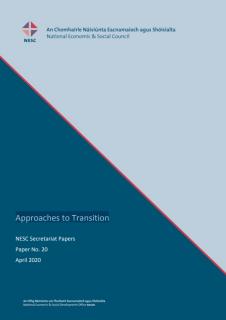
Ireland faces unprecedented structural economic and social change in the coming decades, through the transition away from fossil fuels to a low-carbon society and the digitalisation transition (automation and application of emerging technologies). While there are mixed lessons from historical industrial and energy transitions, the low-carbon transition and digital transitions are ‘live’ and, arguably, uniquely challenging. None of the past transitions faced intertwined social, technological and ecological problems of the scale facing human kind in the early 21st century. The transitions facing Ireland also lie ahead in almost all countries.
This paper looks at how transitions are approached, including experiences and approaches to governance elsewhere, particularly in relation to protecting vulnerable groups and sectors. It seeks to identify insights and lessons from past and current international experience. These approaches indicate the range of perspectives at play which touches on some fundamental questions about the role of society in shaping these transitions, some different perspectives on the benefits and risks in the future of work, and the scale and speed of the transformations required. Therefore, this paper seeks to develop a shared understanding of the practical ways and strategies that could be applied to support and build resilience for those most challenged by Ireland’s low-carbon and digital transitions.
